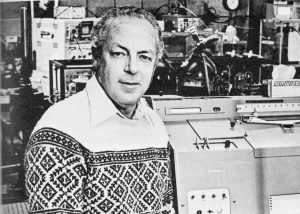
Thomas C. Bruice
University of California, Los Angeles
Thomas C. Bruice was born in 1925 in Los Angeles, California. He served in the Navy from 1943 to 1946 and received both Bachelor of Science (1950) and Ph.D. (1954) degrees from the University of Southern California. He has spent time at UCLA (postdoctoral fellow 1954-1955), Yale University (Assistant Professor, 1955-1958), The Johns Hopkins School of Medicine (Associate Professor, 1958-1960), and Cornell University (Professor, 1960-1964), and joined the faculty of the University of California at Santa Barbara in 1964.
Professor Bruice has been honored as a National Research Council Fellow, a National Institutes of Health Career Development Awardee and as a recipient of a National Institutes of Health Career Investigatorship. In 1974, he was elected a member of the National Academy of Sciences of the United States and in 1976, he was elected a member of the American Academy of Arts and Sciences. He has served as a consultant to the National Institutes of Health and the National Science Foundation and is presently a member of the Editorial Board of Biochemistry and the Advisory Board of the Petroleum Research Foundation. Professor Bruice is a member of the American Chemical Society, the Chemical Society (London) and Federation of American Societies for Experimental Biology. His research endeavors encompass many problems in chemistry but tend to be centered in the application of mechanistic chemistry to the solution of problems of biochemical importance.
Thursday, April 19, 1979
Social Hour 5:45 PM UCLA Faculty Center – Sequoia Room, Patio
Dinner 6:45 PM UCLA Faculty Center – Sequoia Room
Award Address 8:00 PM Lecture Rm. 2224, Wm. G. Young Hall (Chemistry) UCLA
1978 Tolman Award Recipient:
Thomas c. Bruice
Professor of Chemistry
University of California, Santa Barbara
“The Chemistry of Epoxides of Aromatic Hydrocarbons:
Carcinogenicity vs. Reactivity
Abstract: Expoxides of aromatic metabolites such as phenyl alanine and tryptophane are normal intermediates in the biosynthesis of important biological compounds (tyrosine, seretonin, etc.) while epoxides of polycyclic hydrocarbons are formed in the normal course of detoxification of xenobiotic compounds. Among the latter epoxides are found the carcinogenic K-region oxides and a series of epoxides which upon hydrolysis and re-epoxidation yield the so-called bay-region-tetrahydro-diol-epoxides. These compounds are the ultimate carcinogenic agents formed from polycyclic aromatic hydrocarbons. A comparison of the chemistry of the various classes of epoxides derived from aromatic hydrocarbons will be presented. Of particular concern will be a discussion of the mechanisms and efficiencies of re-arrangement reactions (NIH shift, oxygen walk) and nucleophilic additions and how these reactions relate to carcinogenicity.
Reservations: Call Betty at 469-7278 before 3:00 p.m., Tuesday, April 17, 1979. The cocktail hour will be hosted by friends of the awardee in Santa Barbara. Roast sirloin of blue ribbon beef dinner will be $8.50 per person with reservations. Due to limited seating, no dinner can be served without reservations. Non-ACS members and guests are welcome to attend. If you do not wish to dine, you may attend the meeting at 2224 Young Hall, UCLA Campus, at 8:00 p.m. for the Award Address.
